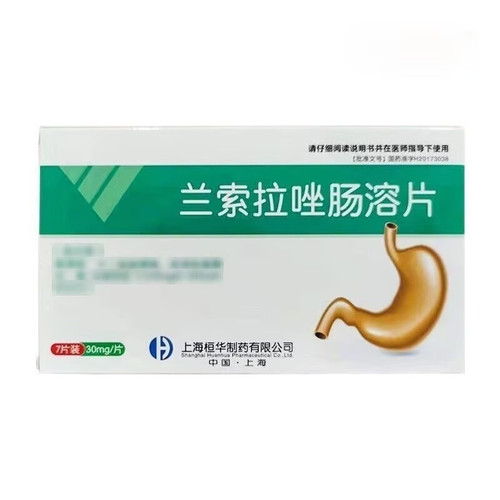Product Overview
【Drug Name】
Generic Name: Mesalazine Enteric-coated Tablets
Brand Name: Anjiesha Mesalazine Enteric-coated Tablets 0.4g*24 tablets
Pinyin: AnJieShaMeiShaLaQinChangRongPian 0.4g*24Pian
【Main Ingredients】
The main ingredient of this product is mesalazine.
【Appearance】
This product is a brownish-red enteric-coated tablet. After removing the coating, the tablet core is light brown.
【Indications/Main Functions】
1. For the treatment of ulcerative colitis: including the treatment of acute exacerbations and maintenance therapy to prevent relapse; 2. For the treatment of acute exacerbations of Crohn's disease.
【Specifications】
0.4g*24 tablets (Anjiesha)
【Dosage and Administration】
Oral administration. The usual adult dose is 1-2 tablets/time, 3 times a day. For mild to moderate acute cases, the dose may be increased to 12 tablets/day, or as directed by a physician.
【Adverse Reactions】
Similar to a few patients who cannot tolerate sulfasalazine, the main side effects include nausea, diarrhea, abdominal pain, heartburn, loss of appetite, abdominal distension, back pain, constipation, menstrual irregularities, and, in rare cases, headache. Patients who have previously experienced worsening of colitis with sulfasalazine should also consider this before using this product. Rarely reported adverse reactions include leukopenia, thrombocytopenia, neutropenia, pancreatitis, hepatitis, pericarditis, myocarditis, alveolar alveolar inflammation, dosage form interstitial nephritis, nephrotic syndrome, and renal failure. These symptoms usually disappear after discontinuation of the drug. If signs of renal failure appear during treatment, the possibility of drug-induced kidney toxicity should be considered. No cases of bone marrow suppression, decreased sperm count, or decreased sperm motility have been observed with sulfasalazine.
【Contraindications】
This product is contraindicated in patients with a history of allergy to salicylates or those with severe renal impairment (glomerular filtration rate <20 ml/min).
【Drug Interactions】
This product should not be used concurrently with lactulose or similar drugs that lower fecal pH to avoid delaying drug release.
【Precautions】
Mesalazine is rapidly excreted by the kidneys in the form of its metabolite, N-acetyl-5-aminosalicylic acid. Although no renal damage has been observed in patients taking this product, its use is not recommended for those with impaired renal function. Caution should also be exercised in patients with hematuria and high proteinuria.
【Pediatric Use】
There are no research data on pediatric use. Therefore, it is not recommended for children, and is contraindicated in children under two years of age.
【Use in Elderly Patients】
Use with caution. The user must have normal renal function.
【Overdosage】
In case of overdosage, immediate gastric lavage and electrolyte replacement are necessary to accelerate urination. There is no specific antagonist for this product.
【Pharmacology and Toxicology】
Pharmacological Action: Mesalazine is the main active ingredient of sulfasalazine. It is used to treat ulcerative colitis. In the colon, sulfasalazine is converted into equal molecular weights of sulfapyridine and mesalazine by bacteria. The mechanism of action of mesalazine (and sulfasalazine) is not yet clear, but it may exert its effects primarily through local rather than systemic action. In patients with chronic inflammatory bowel disease, the production of arachidonic acid metabolites in the local mucosa increases through the cyclooxygenase pathway (producing prostaglandins) and the lipoxygenase pathway (producing leukotrienes and hydroxyeicosatetraenoic acid). Mesalazine may alleviate local inflammation by inhibiting the production of cyclooxygenase and prostaglandins in the colon. Toxicological Studies: Genotoxicity: Ames test, sister chromosome exchange induction test, in vitro staining aberration test of Chinese hamster ovary cells, and mouse bone marrow polychromatographic micronucleus test results were all negative. Reproductive Toxicity: Oral administration of doses up to 480 mg/kg/day to rats did not show any effect on female fertility or reproductive function. In rats and rabbits, doses up to 480 mg/kg/day did not show teratogenicity or fetal toxicity from mesalazine. However, adequate and well-controlled clinical data are lacking in pregnant women. Because animal reproductive studies do not always predict drug effects in humans, this product should only be used in pregnant women when clearly necessary. Monitoring of low and high concentrations of the N-acetyl metabolite of mesalazine in human milk has unclear clinical significance. Caution should be exercised when administering mesalazine to lactating women. Carcinogenicity: In rats and mice, administration of mesalazine at doses of 480 mg/kg/day and 2000 mg/kg/day, respectively, 2.4 times and 5.1 times the maximum recommended maintenance dose for humans (1.6 g/day, based on body surface area), did not show carcinogenic effects.









